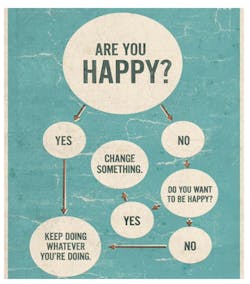Unhappy with the dental practice where you work? When is it time to leave?
Well, if you’re married to the dentist, then this article is not for you. That being said, I would like to give a nod of respect to all members of the dental profession who are married to their doctor. They deserve serious kudos because I have no idea how they do it. But for the rest of us, we need to talk.
Have you ever had that dream-crushing moment when you realize the path you’ve worked so hard to be on is probably coming to an abrupt end? It could be your job, a relationship, or the 2012 BCS National Championship being ripped away by the Crimson Tide. (That just shows sheer, undying pain). No matter the situation, it’s difficult to get through. So let’s talk about when you think your time at an office has run its course.
When these thoughts begin, people initially fall victim to their fears by thinking about the uncertainty of change. We do whatever we can to stay in familiar surroundings, even if it creates an emotional wound that could turn into a painful memory every time we see the scar. So why is it so hard to let go of a job when we’re unhappy? How do we know if leaving is the right decision? And where should we even start?
Sugar-coating misery, and two real-life examples of what that looks like
I recently met an office manager who lives on the opposite side of the country. She’s the type of person who projects the sun’s warmth in her eyes. I’m pretty sure if you opened her purse, flocks of butterflies would fly out. After about an hour of talking with me, she opened up about the struggles at her practice. She told me that every afternoon the doctor goes through everyone’s work from the entire day to check for accuracy. She said he goes through virtually every click they made, every phone call they took, and every letter typed in the chart notes.
This takes hours and they often are not able to leave the office until midnight since no one is allowed to go home until he is completely finished. MIDNIGHT. I legitimately wanted to cry for her. She timidly started to justify this nonsense by saying how dedicated she is to the office and she doesn’t want to let down her staff by leaving. She also mentioned that she dreaded the thought of starting over at a new office.
As much as I can respect that, I still wanted to suggest she march into that doctor’s office first thing Monday morning, give him the Z snap, and say, “I’m outta here, you controlling monster!” But I remembered we have all disguised misery that comes from the fear of failure. Even this friend was guilty.
Years ago, this friend managed an office that had a “professional and personal consultant” who literally never worked in dentistry a day in his life (cue eye roll). This friend was morally not okay with the changes the consultant made to the practice, a practice she worked very hard for.
Well, it didn’t take much time for the practice to go downhill, but the dentist refused to believe the pricey consultant was the culprit. The smooth-talking consultant was able to wordsmith his way around of the doctor’s frustrations by blaming the staff for the lack of his success, and placing the majority of the blame on my friend. This chaotic blame cycle went on for quite some time before it came to a boiling point. My friend was told something that she will never forget, which created an “emotional scar” if you will. The doctor, who despised his staff at this point because of the consultant, called her into his office one morning and said, “You know, I realized why I don’t enjoy coming into work. I hate coming in to see your face.”
It wasn’t much longer until my friend made the long-overdue decision to leave that practice, and she never looked back. Over time she wondered why she stayed there so long. Nothing is worth it if someone is that unhappy.
So what’s the common dominator here regarding unmasking misery? If we find ourselves in an unhappy situation that is not changing, regardless of how many hours we’ve slaved away, it is not considered failure to walk away. In fact, we can actually make things worse for all parties if we deny how bad things really are and continue to put ourselves through the misery.
ALSO BY COURTNEY ROBERTS:Can dental practices learn from the fast food industry? Turns out, they can
Knowing when it’s time to go
Still not convinced you won’t regret leaving? Well, my friend approached her fears with a methodical plan. Not only did a simple and effective strategy keep her emotions organized, she was able to remain confident during this daunting situation. I recommend this four-step formula, and if you follow these steps you should have a clear understanding if it’s time for you to leave:
Step 1–The grass isn’t always greener on the other side. It’s green where you water it (and that starts with you). Personally, I was ignorant about my own poor communication and interpersonal skills before I started reading self-help books. I promise, you have an entire galaxy of untapped potential in these books and they will give you a pivotal perspective for any major-life decisions. I highly recommend “The 7 Habits of Highly Effective People,” “The Charisma Myth,” “Who Moved My Cheese?” and “Smart Talk.”
Step 2—Communicate. Now that you have the right tools from your self-help books to get you through tough situations, you’ll have the power to effectively communicate your problems better than ever. Even if you have already spoken with the doctor about issues in the past, you might be able to speak from a different angle now. It would be extremely unfortunate if you left the practice simply because you were misunderstood. So try to talk it out one last time.
Step 3—Now we wait. Choose a trial period and start it immediately after step 2, say, within 60 days. during those 60 days you implement all the knowledge you received from step 1 and evaluate every situation for improvement. Your new attitude and new way of communicating may be what was missing.
Step 4—Take advice and roll the dice (yes, I made that up). If at this point things are not improving and you’ve done all you can, seek out an unbiased person, someone you trust immensely, and treat him or her to coffee. Explain the situation at work, talk about the changes you’ve made and what the results were. If their jaw drops to the floor and they tell you to run like hell, then seriously consider the advice. We know we can become accustomed to how bad things really are, and an unbiased person can clear things up and put them in perspective. If you don’t have anyone to talk to, just pretend. Pretend an unbiased friend is telling you the situation, and think about the honest feedback you would give them. True honesty will go a long way.
So here we are. We know that simply because we’re in a situation we cannot change, we did not fail. We know that simply remaining in our “comfort zone” is never the answer. We know that if we are considering leaving a job, we can follow the four steps discussed here to lead us to a wise and calculated choice.
And remember, don’t let someone dim your light simply because it’s shining in their eyes. If you make the choice to find a new position, any practice will be lucky to have you!









